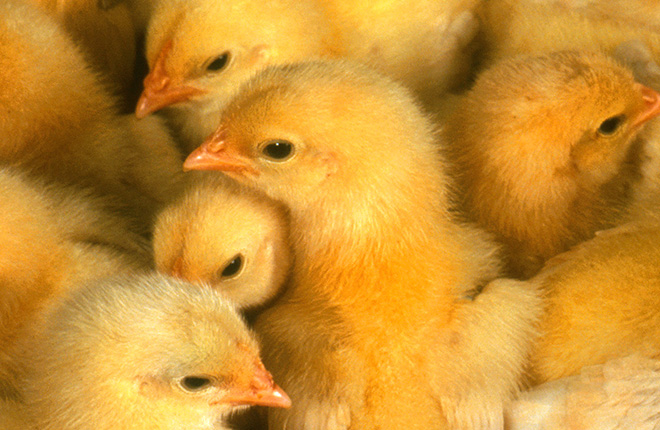Treating Birds for Aggression
Serotonin, a chemical in our bodies that helps balance moods, may be one solution for reducing aggressive behavior in chickens.
Aggressive behavior in poultry—a major welfare concern in the egg production industry—increases stress, feather pecking, and bodily injury, which can lead to cannibalism. Housing environments have been modified to help prevent aggression, but these methods have had limited success and provide no guarantee in preventing abnormal behavior in birds. Treatment often involves trimming birds’ beaks to decrease injury and death.
At the Agricultural Research Service’s Livestock Behavior Research Unit in West Lafayette, Indiana, biologist Heng-wei Cheng and his colleagues are examining the use of serotonin as an alternative method to reduce aggressive behavior in birds before they hatch. They are studying the effects of increasing serotonin during the embryonic stage to control these abnormal behaviors in chickens.
“Serotonin is a neurotransmitter that’s present in the egg during the earliest stages of development,” Cheng says. “In a preliminary experiment, 5- to 6-week-old birds that hatched from eggs injected with serotonin were much less aggressive and had a gentle behavior.”
In a more recent study, fertilized eggs were treated immediately prior to incubation with a single dose of a serotonin obtained from a commercial company. Eggs were then incubated and allowed to hatch, and the female chicks were raised to maturity—18 weeks of age. At the ages of 9 and 18 weeks, birds were examined for aggression and fearfulness.
“We found that birds from eggs treated with serotonin were less aggressive but had a greater fear response than the untreated control birds,” Cheng says. “Those treated with serotonin showed no differences in their body weight compared with untreated controls.”
Findings suggest that a prenatal increase in serotonin concentrations has long-term effects on the bird’s behavior and potentially improves the bird’s well-being. “If we can change the behavior of chickens at an early age, then later we don’t have to use beak treatment, which may be painful if improperly done and can affect the birds’ eating behavior,” Cheng says. “The serotonin alternative treatment would be a huge benefit for producers and the welfare of chickens.”
The technology used to treat eggs with serotonin is already available in the poultry industry, Cheng says. Equipment used to vaccinate birds before hatching against various diseases can be adapted to administer serotonin at the embryonic stage, making the process easy and affordable.
Scientists plan to conduct additional studies, which include monitoring serotonin-treated birds up to 40 weeks, to confirm these findings.—By Sandra Avant, Agricultural Research Service Information Staff.
“Treating Birds for Aggression” was published in the November 2015 issue of AgResearch Magazine.
Key Facts
- Aggressive behavior in chickens is a threat to their health.
- Serotonin-treated birds are calmer.
- Serotonin can be given while the chick is still in the egg.
Full Story







